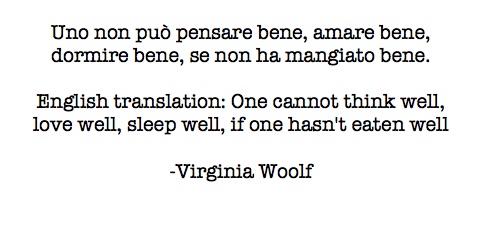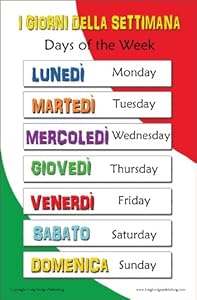Survival Italian (Italiano)
Italian is considered one of the easiest languages to learn. Many students have been able to master it in a short period of time!
Italian is often described both as the language of art and music and as the language best suited for singing. Italian is easy to learn.
 Italian Greetings
Knowing Italian greetings can make a good impression, whether you’re speaking Italian for business or while traveling. Offer polite greetings to friends and associates or as a way to break the ice when meeting new people. These are some common greetings in Italian:
Italian Greetings
Knowing Italian greetings can make a good impression, whether you’re speaking Italian for business or while traveling. Offer polite greetings to friends and associates or as a way to break the ice when meeting new people. These are some common greetings in Italian:
- Buongiorno! (bwohn-johr-noh) (Hello! and Good morning!)
- Arrivederci! (ahr-ree-veh-dehr-chee) (Goodbye!) (Formal)
- Ciao! (chou) (Hello! and Good-bye!) (Informal)
- Salve! (sahl-veh) (Hello! and Good-bye!) (Neutral)
- Buonasera! (bwoh-nah-seh-rah) (Good afternoon! Good evening!) (Formal)
- Buonanotte! (bwoh-nah-noht-teh) (Good night!) (Informal)
- Come si chiama? (koh-meh see kyah-mah) (What is your name?) (Formal)
- Come ti chiami? (koh-meh tee kyah-mee) (What is your name?) (Informal)
- Mi chiamo…(mee kyah-moh) (My name is. . .)
- Come sta? (koh-meh stah) (How are you?) (Formal)
- Come stai? (koh-meh stahy) (How are you?) (Informal)
- Bene, grazie. (beh-neh grah-tsee-eh) (Fine, thank you.)
 Italian Courtesy Phrases
Italian Courtesy Phrases
Courtesy is important no matter what country you’re in. Use these courtesy phrases when speaking in Italian so you can be considerate and polite; they’ll also help you communicate easily:
- Per favore(pehr fah-voh-reh) (Please.)
- Per piacere (pehr pyah-cheh-reh) (Please.)
- Grazie(grah-tsee-eh) (Thank you.)
- Prego!(preh-goh) (You’re welcome!; By all means, after you.)
- Non c’è di che.(nohn cheh dee keh) (You’re welcome.)
- Mi dispiace.(mee dees-pyah-cheh) (I’m sorry.)
- Mi scusi.(mee skooh-zee) (Excuse me, formal.)
- Scusi, un informazione, per favore.(skooh-zee oohn-een-fohr-mats-yoh-neh pehr fah-voh-reh) (Excuse me, I need some information, please.)
- (skooh-zah) (Excuse me, I’m sorry, informal)
- Permesso?(pehr-mehs-soh) (Excuse me — when walking through a crowded train compartment; also, “May I come in?” when crossing the threshold of someone’s house.)
- Sì.(see) (Yes.)
- (noh) (No.)
 Basic Question Words in Italian
Basic Question Words in Italian
To communicate in Italian and to travel with ease, there are practical questions in Italian (or any language for that matter) that you’ll use daily and have to know:
- Parla inglese?(pahr-lah een-gleh-zeh) (Do you speak English?)
- Chi?(kee) (Who?)
- Cosa?(koh-sah) (What?)
- Quando?(kwahn-doh) (When?)
- Dove?(doh-veh) (Where?)
- Perché?(pehr-keh) (Why?)
- Come?(koh-meh) (How?)
- Quanto?(kwanh-toh) (How much?)
Try these helpful phrases:
- Dov’è la stazione?(doh-veh lah stah-tsyoh-neh) (Where is the station?)
- Scusi, dov’è il bagno?(skooh-zee doh-veh eel bahn-yoh) (Where is the bathroom?)
- Quanto dista il Colosseo?(kwahn-toh dees-tah eel koh-lohs-seh-oh) (How far is the Coloseum?)

- Dove si mangia il miglior gelato?(doh-veh see mahn-jah eel meel-yohrgeh-lah-toh) (Where can you get the best ice cream?)
Come si arriva in Piazza della Repubblica? (
koh-meh see ahr-
ree-vah een
pyahts-sah
dehl-lah reh-
pooh-blee-kah) (How do you get to Piazza della Repubblica?)
Days of the Week in Italian
In Italian, the days of the week aren’t capitalized. Eyeball this table of the days of the week in Italian (along with pronunciations and abbreviations) to ensure you get your days straight while in Italy.
| Italian/Abbreviation |
Pronunciation |
Translation |
| domenica/do. |
doh-meh-nee-kah |
Sunday |
| lunedì/lun. |
looh-neh-dee |
Monday |
| martedì/mar. |
mahr-teh-dee |
Tuesday |
| mercoledì/mer. |
mehr-koh-leh-dee |
Wednesday |
| giovedì/gio. |
joh-veh-dee |
Thursday |
| venerdì/ven. |
veh-nehr-dee |
Friday |
| sabato/sab. |
sah-bah-toh |
Saturday |
You might also need to know how to say the following:
- Oggi (ohj-jee)(today)
- Domani (doh-mah-nee)(tomorrow)
- Dopodomani (doh-poh-doh-mah-nee) (day after tomorrow)
- Ieri (yeh-ree) (yesterday)
Some Essential Phrases in Italian
| English |
Italian |
| Hello |
Buongiorno |
| Good evening |
Buonasera |
| Goodbye |
Arriverderci |
| See you later |
A dopo |
| Yes |
Sì |
| No |
No |
| Excuse me! |
Per favore! |
| Thanks |
Grazie |
| Thanks a lot |
Grazie mille |
| Thank you for your help |
Grazie per il suo aiuto |
| Don’t mention it |
Prego |
| Ok |
Va bene |
| How much is it? |
Quanto costa, per favore? |
| Sorry! |
Mi scusi ! |
| I don’t understand |
Non ho capito |
| I get it |
Ho capito |
| I don’t know |
Non so |
| Forbidden |
Vietato |
| Excuse me, where are the toilets? |
Dov’è il bagno per favore ? |
| Happy New Year! |
Buon anno! |
| Happy birthday! |
Buon compleanno! |
| Happy holiday! |
Buone feste! |
| Congratulations! |
Congratulazioni! |
Italian/Vocabulary/Household
- la camera = the room
- la camera da letto = the bedroom
- il caminetto = the fireplace
- il camino = the chimney
- la cantina = the cellar
- la casa = the house
- la credenza = the cupboard/closet
- la cucina = the kitchen
- il divano = the sofa
- la entrata = the hall
- la finestra = the window
- il forno = the oven
- il frigorifero = the fridge
- il fuoco = the fire
- il gabinetto = the lavatory
- il giardino = the garden
- il guardaroba = the wardrobe
- l’isolato = the block of flats
- la lavabiancheria = the washing machine
- il lavabo = the washbasin
- il lavello = the sink
- il letto = the bed
- la parete = the wall
- la pattumiera = the dustbin
- il pavimento = the floor
- il pendolo = the clock
- la poltrona = the armchair
- la porta = the door
- il portone = the front door
- il riscaldamento centrale = the central heating
- il rubinetto = the tap
- la sala da bagno = the bathroom
- la sala da pranzo = the dining room
- la scala = the stairs
- la sedia = the chair
- il soffitto = the ceiling
- lo specchio = the mirror
- il tappeto = the carpet/rug
- la tavola = the table
- il televisore = the television set
- la tenda = the curtain
- il tetto = the roof
Italian/Vocabulary/Family
- Miei Parenti My relatives
- Mio Cugino My cousin (male)
- Mia Cugina My cousin (female)
- Mio Nipote My grandson/nephew
- Mia Nipote My granddaughter/niece
- Mio Patrigno My step father
- Mia Matrigna My step mother
- Mio Suocero My father-in-law
- Mia Suocera My mother-in-law
- Mia Nuora My daughter-in-law
- Mio Cognato My brother-in-law
- Mia Cognata My sister-in-law
Italian/Vocabulary/Household Chores
I lavori di casa
- To sweep the floor = Spazzare il pavimento
- The broom = la scopa
- The dustpan = la paletta per la spazzatura
- To mop the floor = Passare lo straccio sul pavimento
- The mop = lo spazzolone per il pavimento
- To dust = spolverare
- Change the lightbulb = Cambiare/sostituire la lampadina
Italian/Vocabulary/Time
- Che ore sono? = What time is it?
- Sono le dodici in punto. = It’s twelve o’clock.
- E’ l’una in punto. = It’s one o’clock.
- Sono le due e cinque. = It’s five past two.
- Sono le sette e mezzo. = It’s half past seven.
- Sono le sette e trentacinque = It’s twenty five to eight.
- Sono le nove meno venti. = It is twenty to nine.
- Sono le dieci meno un quarto. = It’s quarter to ten.
- mezzogiorno = midday
- mezzanotte = midnight
- la mattina = the morning
- il pomeriggio = the afternoon
- la notte = the night
- oggi = today
- ieri = yesterday
- l’altro ieri = the day before yesterday
- la notte scorsa = last night
- domani = tomorrow
- dopodomani = the day after tomorrow
Italian/Vocabulary/Professions
- l’agricoltore/l’agricoltrice (more common “coltivatrice diretta”) = the farmer
- l’architetto (m/f)/l’architetta (less common) = the architect
- l’atleta (m/f) = the athlete
- l’avvocato (m/f)/l’avvocatessa = the lawyer
- il/la barista = the barman/barmaid
- il bibliotecario/ la bibliotecaria = the librarian
- il cacciatore/la cacciatrice = the hunter
- il cameriere/la cameriera = the waiter/waitress
- il/la camionista = the lorry driver
- il chirurgo/la chirurga = the surgeon
- il commesso/la commessa = the shop assistant
- il/la conducente di autobus = the bus driver
- il dottore/la dottoressa = the doctor
- l’elettricista (m/f) = the electrician
- il funzionario/la funzionaria = the official
- il giocatore di calico/ la giocatrice di calcio = the footballer
- il/la giornalista = the journalist
- il/la guardia parco = the park warden
- l’idraulico/l’idraulica = the plumber
- l’impiegato/l’impiegata = the employee, office worker
- l’infermiere/l’infermiera = the nurse
- l’ingegnere (m/f) = the engineer
- l’insegnante (m/f) = the teacher
- il maestro/la maestra = the primary school teacher
- il marinaio/la marinaia = the sailor
- il meccanico/la meccanica = the mechanic
- il muratore/la muratrice = the building worker
- il/la musicista = the musician
- il/la negoziante = the shopkeeper
- l’operaio/l’operaia = the worker
- l’operaio edile = the building worker
- il parrucchiere/la parrucchiera = the hairdresser
- il pescatore/la pescatrice = the fisherman/fisherwoman
- il/la pilota = the pilot
- il politico = the politician
- il poliziotto/la poliziotta = the policeman/policewoman
- il pompiere/la pompiera = the fireman/firewoman
- il postino/la postina = the postman/postwoman
- il prete = the priest
- il soldato/la soldatessa = the soldier
- lo sportivo/la sportiva = the sportsman/sportswoman
- il tassista/ la tassista = the taxi driver
- l’ uomo d’affari/la donna d’affari = the businessman/businesswoman
]]>
 Italian Greetings
Knowing Italian greetings can make a good impression, whether you’re speaking Italian for business or while traveling. Offer polite greetings to friends and associates or as a way to break the ice when meeting new people. These are some common greetings in Italian:
Italian Greetings
Knowing Italian greetings can make a good impression, whether you’re speaking Italian for business or while traveling. Offer polite greetings to friends and associates or as a way to break the ice when meeting new people. These are some common greetings in Italian:
 Italian Courtesy Phrases
Courtesy is important no matter what country you’re in. Use these courtesy phrases when speaking in Italian so you can be considerate and polite; they’ll also help you communicate easily:
Italian Courtesy Phrases
Courtesy is important no matter what country you’re in. Use these courtesy phrases when speaking in Italian so you can be considerate and polite; they’ll also help you communicate easily:
 Basic Question Words in Italian
To communicate in Italian and to travel with ease, there are practical questions in Italian (or any language for that matter) that you’ll use daily and have to know:
Basic Question Words in Italian
To communicate in Italian and to travel with ease, there are practical questions in Italian (or any language for that matter) that you’ll use daily and have to know:

